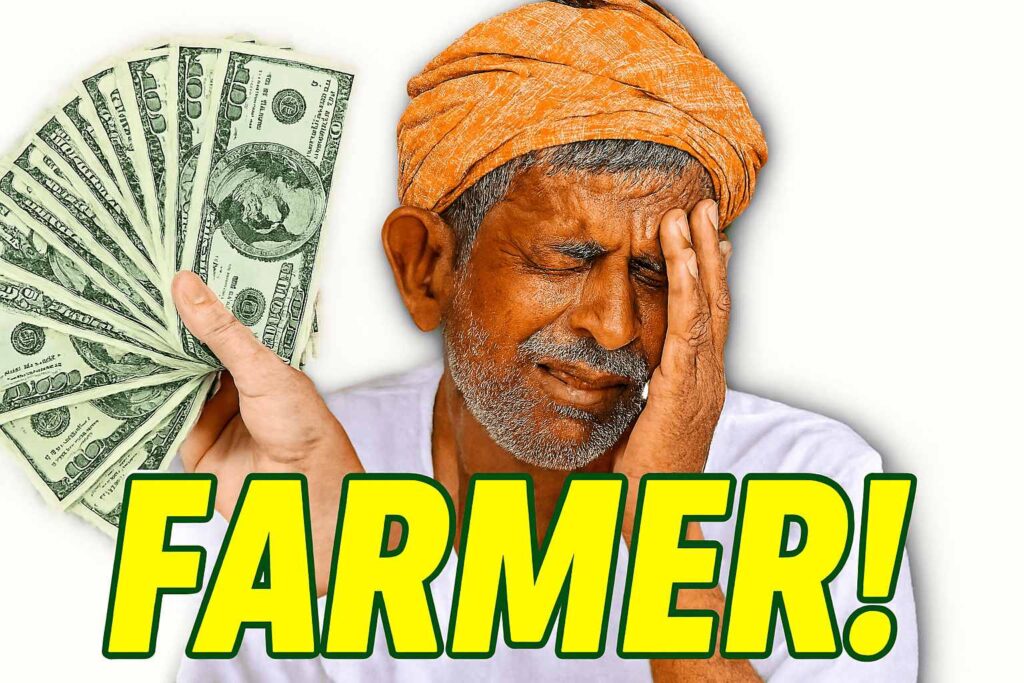Prime Minister Shri Narendra Modi launches two major schemes in the agriculture sector with an outlay of Rs 35,440 crore
For the self-reliance of the country, for the welfare of farmers, two new schemes are being launched. The PM Dhan Dhaanya Krishi Yojana and the Dalhan Atmanirbharta Mission: PM
We have undertaken reforms, from seeds to the market in the interest of farmers: PM
Selection of 100 districts for the PM Dhan Dhaanya Scheme is based on three parameters: PM
Dalhan Aatmnirbharta Mission is not just a mission to increase pulse production but also a campaign to empower our future generations:PM
For the past 11 years, the government’s continuous effort has been to empower farmers and increase investment in agriculture: PM
Animal husbandry, fish farming, and beekeeping have empowered small farmers and landless families: PM
Today, in the villages, Namo Drone Didis are leading the modern methods of spraying fertilizers and pesticides: PM
On one hand, we need to be self-reliant and on the other we also need to produce for the global market: PM
Prime Minister Shri Narendra Modi participated in a special Krishi programme at the Indian Agricultural Research Institute in New Delhi, today. The Prime Minister also interacted with farmers before participating in the public programme.
The Prime Minister launched two major schemes in the agriculture sector, with an outlay of Rs 35,440 crore. He launched the PM Dhan Dhaanya Krishi Yojana which has an outlay of Rs.24,000 crore. He also launched the Mission for Aatmanirbharta in Pulses with an outlay of Rs. 11,440 crore. The Prime Minister also inaugurated and dedicated to the nation projects valued at over Rs 5,450 crore in the agriculture, animal husbandry, fisheries, and food processing sectors, while laying the foundation stone for additional projects worth around Rs 815 crore.
Addressing the nation, the Prime Minister remarked, “Today is a historic day that marks the birth anniversaries of two of Maa Bharati’s illustrious sons who redefined India’s democratic fabric and rural development. Jayaprakash Narayan ji and Nanaji Deshmukh ji were the voices of rural Bharat and dedicated their lives to the empowerment of farmers and the underprivileged”.
Marking the significant occasion, the Prime Minister underscored that the Pradhan Mantri Dhan-Dhaanya Krishi Yojana and Dalhan Atmanirbharta Mission (Pulse Self-Reliance Mission) are designed to usher in a new era of self-reliance, rural empowerment, and agricultural innovation, directly benefiting crores of farmers across the nation. “The Government of India will invest over ₹35,000 crore in these initiatives, reflecting its unwavering commitment to doubling farmers’ incomes and achieving food and nutritional security for the country”, Shri Modi said.
The Prime Minister emphasized the central role that agriculture and farming have always played in India’s development journey. Addressing the nation, the Prime Minister recalled the long-standing neglect faced by the agricultural sector during previous governments and reaffirmed his commitment to empowering India’s farmers. He noted that a rapidly developing 21st-century India required a robust and reformed agricultural system, and this transformation began after 2014 under his government. “We broke away from the apathy of the past. From seed to market, we introduced comprehensive reforms in the interest of our farmers. These reforms were not just policy changes. They were structural interventions aimed at making Indian agriculture modern, sustainable, and resilient,” Shri Modi said.
The Prime Minister stated that in the last eleven years, India’s agricultural exports have nearly doubled. Foodgrain production has increased by approximately 90 million metric tonnes. Fruit and vegetable production has grown by more than 64 million metric tonnes. India today ranks first in the world in milk production and is the second-largest fish producer globally. Honey production has doubled compared to 2014, and egg production has also doubled over the same period.
He further informed that six major fertilizer plants have been established in the country during this time. More than 25 crore Soil Health Cards have been distributed to farmers. Micro-irrigation facilities have reached 100 lakh hectares of agricultural land. Under the Pradhan Mantri Fasal Bima Yojana, insurance claims worth ₹2 lakh crore have been disbursed to farmers.
Over the past eleven years, more than 10,000 Farmer Producer Organizations (FPOs) have been formed to enhance farmer cooperation and market access.
The Prime Minister shared that he had spent time interacting with farmers, fishermen, and women working in the agriculture sector. He listened to their experiences and insights and noted that such interactions reflect the true transformation taking place in Indian agriculture.
The Prime Minister stated that the current spirit of the nation no longer settles for limited achievements. He emphasized that if India is to become a developed country, continuous improvement and progress in every sector is essential. It is with this vision that the PM Dhan-Dhaanya Krishi Yojana has been launched.
The Prime Minister highlighted that this new agricultural initiative draws inspiration from the success of the Aspirational Districts Programme. He recalled how previous governments had declared over a hundred districts in the country as “backward” and largely neglected them thereafter. In contrast, his government chose to focus on these districts with a targeted and dynamic approach, redesignating them as “aspirational districts.”
He outlined the strategy of convergence, collaboration, and competition for transformation in these districts. “All efforts were united under the spirit of “Sabka Prayas” and a model of healthy competition was encouraged among districts to drive faster development” Shri Modi underscored.
The Prime Minister noted that in these 100+ districts, approximately 20 percent of villages had never seen a road since Independence. “Today, thanks to the focused implementation of the Aspirational Districts Programme, the majority of these villages have been connected with all-weather roads”, Shri Modi added. He also highlighted the improvement in healthcare delivery. At the beginning of the programme, 17 percent of children in these districts remained outside the coverage of basic immunization. Now, most of these children have been brought under full immunization coverage. “Over 15 percent of schools in these districts lacked electricity. Today, nearly every such school has been equipped with a power connection, ensuring a more conducive learning environment for children”, Shri Modi noted.
These achievements, he said, are a direct result of a development model built on convergence, collaboration, and competition, where coordinated efforts across departments and active participation from citizens have delivered tangible results.
Shri Modi emphasized that the inspiration behind the PM Dhan-Dhaanya Krishi Yojana comes directly from the success of the Aspirational Districts model. “The selection of these 100 districts has been carried out with thoughtful consideration and based on three key parameters, First, the level of agricultural output per unit of land. Second, the number of times crops are cultivated on the same land within a year. Third, the availability and extent of institutional loans or investment facilities for farmers” Shri Modi highlighted.
“We have often heard the phrase “36 ka aankda”, a way of saying that two parties are completely at odds with each other. But as a government, we challenge such perceptions and reverse them”, Shri Modi remarked. He underscored that under the PM Dhan-Dhaanya Krishi Yojana, we are bringing together 36 different government schemes in a unified and coordinated manner. Whether it is the National Mission on Natural Farming, the ‘Per Drop More Crop’ campaign for efficient irrigation, or the Oilseeds Mission to boost oilseed production. Many such initiatives are being integrated under one umbrella including special focus on livestock development. “Under the PM Dhan-Dhaanya Krishi Yojana, localized livestock health campaigns will also be launched to ensure continued care and disease prevention at the grassroots level” , Shri Modi said.
The Prime Minister reiterated that just like the Aspirational Districts Programme, the PM Dhan-Dhaanya Krishi Yojana places a significant responsibility not only on the farmers but also on local government officials, particularly the District Magistrate or Collector of each district. The design of this scheme allows flexibility so that the planning can be tailored according to the specific needs of each district. “Therefore, I earnestly urge the farmers and district leaders to prepare district-level action plans that are suited to the local soil and climate conditions”, Shri Modi emphasised.
Shri Modi said that the Dalhan Atmanirbharata Mission is aimed not only at increasing pulse production but also at strengthening the future generations of the country. The Prime Minister highlighted that India’s farmers have recently achieved record production of food grains such as wheat and rice, positioning India among the world’s top producers. “However, there is a need to look beyond just flour and rice for sustenance. While these staples can relieve hunger, proper nutrition requires a more diverse diet. Protein, especially for the largely vegetarian population of India, plays a critical role in both physical and mental growth. Pulses remain the most significant source of plant-based protein” Shri Modi noted.
“The Dalhan Atmanirbharata Mission seeks to address this challenge by boosting domestic pulse production, thereby enhancing nutritional security and self-reliance. The Dalhan Atmanirbharata Mission, with an investment of over 11,000 crore rupees, will provide substantial support to farmers”, he emphasized. Shri Modi highlighted that the goal is to increase the area under pulse cultivation by 35 lakh hectares. Under this mission, production of tur, urad, and masoor pulses will be increased, and a proper system for procurement of pulses will be ensured. This will directly benefit nearly two crore pulse farmers across the country.
Prime Minister Shri Narendra Modi reaffirmed the government’s commitment to the welfare of farmers, describing them as one of the four foundational pillars of a developed India, as outlined in his address from the Red Fort. He stated that over the past eleven years, the government has made consistent efforts to empower farmers and increase investment in agriculture. This priority is clearly visible in the nearly sixfold increase in the agriculture budget during this period.
The Prime Minister emphasized that this expanded budget has primarily benefited small and marginal farmers, who form the backbone of Indian agriculture. Citing an example, he reminded the nation that India provides substantial fertilizer subsidies to support its farmers and reduce their input costs. This policy is part of a broader effort to ensure that agriculture remains sustainable, productive, and profitable for all.
Emphasizing the government’s commitment to increasing farmers’ income by expanding opportunities beyond traditional agriculture, Shri Narendra Modi stated that sectors like animal husbandry, fisheries, and beekeeping are being actively promoted to provide additional income sources, particularly for small and landless farmers.
Highlighting the honey production sector as a success story, the Prime Minister noted that India’s honey output has nearly doubled in the last eleven years. He further shared that while honey exports stood at around ₹450 crore six to seven years ago, they have now surged to over ₹1,500 crore. This dramatic rise in exports, he said, represents three times more income flowing directly to farmers, demonstrating the tangible benefits of agricultural diversification and value addition.
The Prime Minister reiterated the government’s focus on empowering farmers through innovation, investment, and market access, making them key drivers of a self-reliant and developed India.
Shri Modi hailed the growing role of women in transforming Indian agriculture and rural prosperity. He stated that whether in crop cultivation, animal husbandry, or natural farming, women are emerging as key leaders in the rural economy. He cited the government’s ongoing campaign to create three crore ‘Lakhpati Didis’ as a powerful initiative that is also directly supporting the agricultural sector. “One notable example is the rise of Namo Drone Didis across India’s villages, who are now using modern drone technology for spraying fertilizers and pesticides. This innovation has not only improved agricultural efficiency but also provided significant new income streams for rural women”, Shri Modi highlighted.
The Prime Minister also highlighted the critical role of women in promoting natural farming. “More than 17,000 dedicated clusters have been established to support this sustainable approach. Additionally, around 70,000 trained ‘Krishi Sakhis’ are actively providing guidance to farmers on adopting natural and eco-friendly agricultural practices” Shri Modi added.
He reiterated that empowering women in agriculture is not just a matter of social justice, but a strategic step toward achieving a modern, self-reliant, and prosperous rural India.
Highlighting how recent GST reforms have brought direct economic relief to India’s farmers and rural families by making agricultural equipment and essential items more affordable, he noted that under the newly reformed GST system tractor is now ₹40,000 cheaper, offering significant savings to farmers during this festive season with additional price reductions on drip irrigation systems, sprinkler equipment, and harvesting tools. He also highlighted that the cost of organic fertilizers and bio-pesticides, used in natural farming, has come down due to lower GST rates, providing a further boost to sustainable agriculture.
PM Modi emphasized that these reforms have resulted in double savings for rural households and lower costs on both daily use items and farming tools.
Reiterating the historic contribution of Indian farmers in making the country self-reliant in food production, the Prime Minister called upon them to now lead the way in building a developed India. Concluding his address, Shri Modi urged farmers to not only work towards self-sufficiency but also to target the global market by growing export-oriented crops that can reduce imports and boost India’s agricultural exports. He stated that the PM Dhan-Dhaanya Krishi Yojana and the Dalhan Atmanirbharata Mission will play vital roles in this journey and extended his heartfelt congratulations and best wishes to farmers across the nation.
Background
Prime Minister Shri Narendra Modi will participate in a special Krishi programme at the Indian Agricultural Research Institute in New Delhi on 11th October 2025 at 10:30 AM. Prime Minister will interact with farmers and, thereafter, participate in a public programme, where he will address the gathering on the occasion.
The programme underscores the Prime Minister’s continued commitment to farmer welfare, agricultural self-reliance, and strengthening rural infrastructure. It will focus on promoting modern agricultural practices, supporting farmers, and celebrating significant milestones in farmer-centric initiatives.
Prime Minister will launch two major schemes in the agriculture sector, with an outlay of Rs 35,440 crore. He will launch the PM Dhan Dhaanya Krishi Yojana which has an outlay of Rs.24,000 crore. It has the objective of enhancing agricultural productivity, increasing adoption of crop diversification and sustainable agriculture practices, augmenting post-harvest storage at the panchayat and block level, improving irrigation facilities and facilitating availability of long-term and short-term credit in the selected 100 districts.
Prime Minister will also launch the Mission for Aatmanirbharta in Pulses with an outlay of Rs. 11,440 crore. It is aimed at improving productivity levels of pulses, expanding the area under pulse cultivation, strengthening the value chain – procurement, storage, processing – and ensuring reduction of losses.
Prime Minister will also inaugurate and dedicate to the nation projects valued at over Rs 5,450 crore in the agriculture, animal husbandry, fisheries, and food processing sectors, while laying the foundation stone for additional projects worth around Rs 815 crore.
The projects being inaugurated by the Prime Minister include Artificial Insemination Training Center at Bengaluru and in J&K; Centre of Excellence at Amreli and Banas; Establishment of IVF Lab at Assam under Rashtriya Gokul Mission; Milk Powder Plants at Mehsana, Indore, and Bhilwara; Fish Feed Plant under Pradhan Mantri Matsya Sampada Yojana at Tezpur, Assam; Infrastructure for Agro-processing Clusters, Integrated Cold Chain, and Value Addition Infrastructure, among others.
The projects whose foundation stone will be laid by the Prime Minister include Integrated Cold Chain and Value Addition Infrastructure (Irradiation) in Krishna, Andhra Pradesh; Trout Fisheries in Uttarakhand; Integrated Aqua Park in Nagaland; Smart and Integrated Fishing Harbour in Karaikal, Puducherry; and State-of-the-art Integrated Aquapark in Hirakud, Odisha, among others.
During the programme, the Prime Minister will distribute certificates to farmers certified under the National Mission for Natural Farming, MAITRI Technicians, and Primary Agriculture Cooperative Credit Societies (PACS) converted to Pradhan Mantri Kisan Samriddhi Kendras (PMKSKs) and Common Service Centres (CSCs) respectively.
The programme will also mark important milestones achieved under government initiatives, including 50 lakh farmer memberships in 10,000 FPOs, of which 1,100 FPOs recorded an annual turnover of over ₹1 crore in 2024-25. Other achievements include the certification of 50,000 farmers under the National Mission for Natural Farming; certification of 38,000 MAITRIs (Multi-Purpose AI Technicians in Rural India); sanction and operationalization of over 10,000 multipurpose and e-PACS for computerization; and the formation and strengthening of PACS, dairy, and fishery cooperative societies. Over 10,000 PACS have diversified their operations to function as Pradhan Mantri Kisan Samriddhi Kendras (PMKSKs) and Common Service Centres (CSCs).
During the programme, the Prime Minister will interact with farmers engaged in pulses cultivation, who have benefitted from various government schemes aimed at establishing a value chain-based approach in Agriculture, Animal Husbandry, and Fisheries. These farmers have also gained from membership in Farmer Producer Organisations (FPOs) and support under the Agriculture Infrastructure Fund.
अपने किसान, पशुपालक और मछुआरा भाई-बहनों के कल्याण के लिए हम दिन-रात मेहनत कर रहे हैं। इसी दिशा में आज दिल्ली से हजारों करोड़ रुपये की परियोजनाओं का उद्घाटन-शिलान्यास मेरे लिए गर्व का क्षण है।
https://t.co/NZUWauzwYa— Narendra Modi (@narendramodi) October 11, 2025
देश की आत्मनिर्भरता के लिए, किसानों के कल्याण के लिए… दो नई योजनाओं की शुरुआत हो रही है।
1) पीएम धन धान्य कृषि योजना
2) दलहन आत्मनिर्भरता मिशन pic.twitter.com/VCUyEuMEnh
— PMO India (@PMOIndia) October 11, 2025
हमने किसानों के हित में…बीज से लेकर बाज़ार तक reform किए, सुधार किए: PM @narendramodi pic.twitter.com/HDmdIoehKG
— PMO India (@PMOIndia) October 11, 2025
तीन parameters पर पीएम धन-धान्य योजना के लिए 100 जिलों का चयन… pic.twitter.com/RzgHSruRjZ
— PMO India (@PMOIndia) October 11, 2025
दलहन आत्मनिर्भरता मिशन… ये सिर्फ दाल उत्पादन बढ़ाने का मिशन नहीं है बल्कि हमारी भावी पीढ़ी को सशक्त बनाने का भी अभियान है। pic.twitter.com/WNG61HlSBh
— PMO India (@PMOIndia) October 11, 2025
बीते 11 वर्षों से सरकार का निरंतर प्रयास रहा है कि किसान सशक्त हो, खेती पर ज्यादा निवेश हो। pic.twitter.com/jOrq3woN06
— PMO India (@PMOIndia) October 11, 2025
पशुपालन…मछली पालन…मधुमक्खी पालन से छोटे किसानों को, भूमिहीन परिवारों को ताकत मिली है। pic.twitter.com/hlEiLcHH1J
— PMO India (@PMOIndia) October 11, 2025
आज गांवों में नमो ड्रोन दीदियां…खाद और कीटनाशक छिड़काव के आधुनिक तरीकों का नेतृत्व कर रही हैं। pic.twitter.com/VCimayyMNT
— PMO India (@PMOIndia) October 11, 2025
एक तरफ हमें आत्मनिर्भर होना है।
दूसरी तरफ हमें, वैश्विक बाज़ार के लिए भी उत्पादन करना है। pic.twitter.com/CPZAY7d6oC
— PMO India (@PMOIndia) October 11, 2025
MJPS/VJ/AK
(Release ID: 2177772)
Urdu
,
Gujarati





